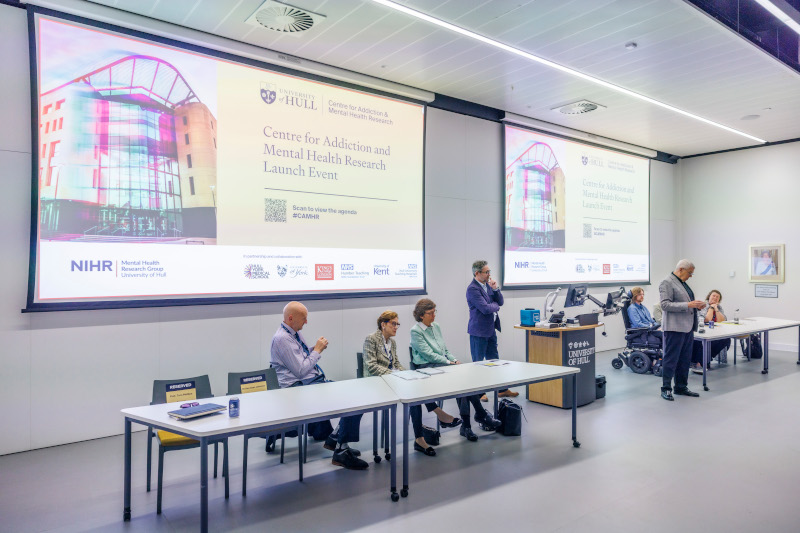Launch of the Centre for Addiction and Mental Health Research (CAMHR).
Posted on Thursday 1 May 2025

The Centre, led by Prof Tom Phillips, Professor of Nursing in Addictions at the University of Hull, and Prof Judith Cohen, Director of the Hull Health Trials Unit, is situated within the University’s Institute for Clinical and Applied Health Research based in the Allam Medical Building. CAMHR is funded for five years by the National Institute for Health and Care Research (NIHR) Mental Health Research Group (MHRG) scheme, as part of the NIHR’s flagship Mental Health Research Initiative. NIHR colleagues were present at the event.
The Institute of Mental Health Research at the University of York (IMRY) is a ‘mentor-partner’ of CAMHR, IMRY’s Director, Professor Lina Gega from Hull York Medical School, and its Deputy Director, Professor Cynthia Iglesias from Health Sciences, are co-investigators. IMRY provides particular expertise in child and adolescent mental health, health economics and Equality, Diversity & Inclusion (EDI).
The Rt Hon Alan Johnson, former Secretary of State for Health and Chancellor of the University of Hull, gave the welcome address. Prof Peter Bower, Professor of Health Services Research at the University of Manchester and Chair of the Oversight Committee for this award, gave an overview of the ambitions of the MHRG scheme: to reshape the mental health research map and drive research funding to those regions in the UK where there is currently a mismatch between need and capacity.
Presentations were also delivered by Professor Dame Carol Black, Chair of the Centre for Ageing Better and chief author of the influential UK Government 10 year drugs strategy ‘From Harm to Hope’ which was a key inspiration in setting up CAMHR, and Professor Anne Lingford-Hughes, Head of the Division of Psychiatry at Imperial College London on her work leading on the addiction healthcare goals for the UK Office for Life Science.
After a break, members of CAMHR spoke about the overall mission of the Centre and the three constituent work streams: 1. improving care pathways and outcomes for young people with substance use and mental health problems; 2. improving care pathways for adults with these challenges who present to places of safety and emergency departments; 3. defining the needs of adults with alcohol-related cognitive impairments. Overviews were also given of the public and patient involvement and engagement and the equality, diversity, inclusion and accessibility strategies which permeate all of CAMHR’s work.
The launch ended with a delicious lunch and the opportunity for the attendees to meet each other and also learn more about CAMHR’s plans and work-to-date from members of the research team.
